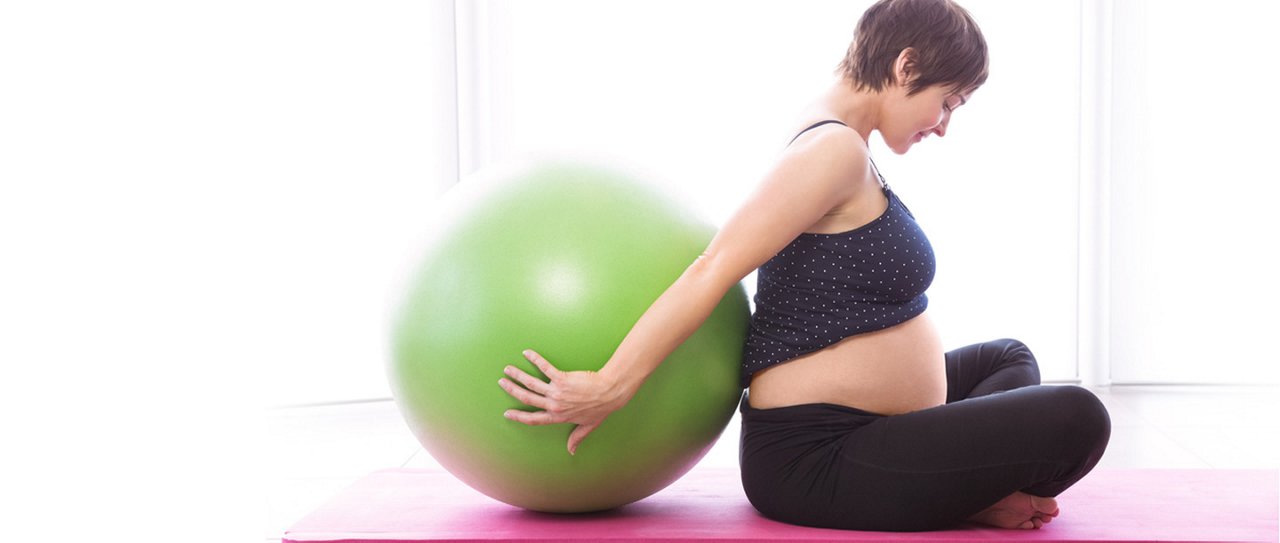Smart tips for exercising while pregnant

If you are a healthy pregnant woman, exercise is great for your overall health. Moderate-intensity activity, such as brisk walking, keeps your heart and lungs healthy. Physical activity also helps improve your mood throughout pregnancy, and postpartum. It also helps you maintain a healthy weight.
According to the American College of Obstetricians and Gynecologists (ACOG), if you are healthy and your pregnancy is normal, it is safe to do most types of exercise, but you may need to make some modifications.
However, it is important to talk with your obstetrician or doctor to get their okay before beginning an exercise program.
Does it really matter if you exercise?
In addition to the scientific evidence that provides a resounding yes, I can tell you from personal experience that whether or not you exercise absolutely makes a difference.
When I had my two kids, I hadn’t yet made my healthy living transformation and didn’t exercise at all. If I could go back in time, I would change that. I would have had a much easier time of pregnancy, delivery, and recovery. I struggled with stiffness, soreness, excessive tiredness, swelling and uncontrolled weight gain throughout.
When I gave birth to my daughter, I weighed almost 100 pounds more than I do now; and 90 pounds more with my son. That’s a lot to carry. My knees, feet, back and even my hands hurt all the time. I struggled with having the physical strength to get through pregnancy and had difficult childbirth exasperated by the weight gain and related issues. I had little stamina in the months after the birth, too, even though I was only in my 20s! The physical challenges made it hard to fully enjoy this time in my life – which then affected my emotional wellbeing, too.
How I wish I had done something about it back then. Looking back, a pool exercise class would have been perfect for me and provided a lot of relief. Mine is not an uncommon story. But it doesn’t have to be yours! Read on for some tips on how exercise can truly help, what kind to do, and how much.
Benefits of prenatal exercise
Regular exercise during pregnancy benefits you and your baby in many ways:
- You’ll experience fewer common prenatal discomforts such as constipation, swelling, leg cramps, insomnia, incontinence, fatigue and back pain.
- May decrease your risk of gestational diabetes, preeclampsia, and cesarean delivery.
- Promotes a healthy weight during and after pregnancy.
- Improves your overall general fitness and strengthens your heart and blood vessels.
- Active women experience fewer feelings of stress, anxiety, and depression, negative emotions that are commonly experienced during pregnancy
Your prenatal exercise will even benefit your child throughout adulthood. A new study confirms that maternal exercise improves the metabolic health of adult offspring.
Good exercises to do while pregnant
- Brisk walking is an easy, effective workout that almost everyone can do.
- Aquatic exercise. The wonderful weightless feeling of being in a pool can be a major relief to pregnant women. Water exercises are also easier on the joints and musculoskeletal system. And, the pressure of water can help lessen fluid retention and swelling, two common discomforts of pregnancy.
- Indoor cycling. Using a stationary bike is a better option than road cycling, due to the potential of falling. Be sure to keep cool and stay hydrated throughout.
- Mind-body classes such as tai chi, yoga, and Pilates are beneficial but should be modified. Seek out prenatal classes, which will teach modified poses that accommodate your shifting balance. Be sure to avoid poses that require you to be still or lie on your back for long periods. Avoid “hot yoga,” which may cause you to become overheated.
- Strength training will help you be better prepared to lift, hold and carry a newborn. In the 2nd and 3rd trimesters, machines are a safer option than free weights, as balance can become an issue.
One size does not fit all when it comes to exercise. The right exercise for you will be based on many factors, including your likes, goals, experience, a current level of physical fitness, expectations, and motivation. Make sure to talk to your doctor to come up with a plan that works for you.
Changes in the body that affect exercise and precautions to take
- In the 2nd and 3rd trimesters, balance becomes a concern as the size of the baby increases. Avoid activities which involve physical contact or danger of falling. Use a chair to hold onto for stability during exercise.
- Adjust your positioning. As your belly grows, you may need to discontinue exercises that require you to lie on your stomach or back. Lying on your back after the 1st trimester can cause a decrease in the blood flow to the pelvic region, which could interfere with the safety of the baby.
- Use caution with ab work. After the first trimester, forceful abdominal exercises such as crunches and sit-ups can contribute to diastasis recti, a separation of the rectus abdominis muscle. Once the connective tissue in the center of the muscle becomes torn, it can take years to repair and may never fully return to its undamaged state. Any type of exercise involving the potential for even mild abdominal trauma should be avoided.
- Don’t overstretch. Stretching can be performed, but with caution, because of the production of relaxin and other hormones during pregnancy that softens the ligaments that support your joints. Don’t go beyond your normal range of motion, even though your joints may allow for greater movement.
- Breathing. Your need for oxygen increases while you are pregnant. You may become short of breath more easily because of increased pressure of the uterus on the diaphragm, a muscle that aids in breathing. These changes may affect your ability to do strenuous exercise, especially if you are overweight.
- Avoid becoming overheated or dehydrated. Drink plenty of water and be sure to exercise in a temperature-controlled environment. Do not exercise outside if it is hot or humid.
This is not an all-inclusive list. Again, be sure to check with your obstetrician for recommendations.
When not to exercise
The ACOG advises that you stop exercising and call your doctor if you have any of these signs or symptoms:
- Bleeding from the vagina
- Feeling dizzy or faint
- Shortness of breath before starting an exercise
- Chest pain
- Headache
- Muscle weakness
- Calf pain or swelling
- Regular, painful contractions of the uterus
- Fluid leaking from the vagina
How much exercise should you do?
The Centers for Disease Control and Prevention (CDC) recommend that healthy pregnant women get at least 150 minutes a week of moderate-intensity aerobic exercise (US Department of Health and Human Services, 2008). This is the same amount recommended for adults in general.
It’s easier than you think. 150 minutes a week equals 30 minutes, five days a week. And it doesn’t have to be done all at once. You can break it up into two 15-minute segments a day. Or three 10-minute sessions. Do what works best for you.
Walking the dog is a great way to get this done. Plus, it will benefit your fur baby, too.
But be sure to start out slowly if you aren’t accustomed to working out. Start with 10 minutes a day and gradually work your way up to more. And if you don’t get there, even 10 minutes a day is better than nothing.
Helpful resources from Blue Cross NC
Blue Cross NC has a program called My Pregnancy, which offers tools, resources, and support. The program includes the My Pregnancy Blue Cross NC app.
- Get the My Pregnancy Blue Cross App on Google Play.
- Download the My Pregnancy Blue Cross App on the Apple App store.
You can find answers to questions, and learn fun facts about your pregnancy. The app is free and you can use it wherever or whenever you want. Blue Cross NC also offers nurse managers, when appropriate, to make sure members have access to the support they need.
Looking for an obstetrician or other health care professional? Use our Find Care tool to locate a provider.
Check out Blue365 for discounts on gym memberships/classes.
Access nutrition counseling services by calling the number on the back of your member ID card or use Find Care.
There is a direct link between healthy mothers and healthy infants. Exercising regularly and eating nutritiously during pregnancy benefits both you and your baby. If you haven’t been exercising regularly, your pregnancy is a great reason to begin!
Browse related articles
Blue Cross and Blue Shield of North Carolina does not discriminate on the basis of race, color, national origin, sex, age or disability in its health programs and activities. Learn more about our non-discrimination policy and no-cost services available to you.
Information in other languages: Español 中文 Tiếng Việt 한국어 Français العَرَبِيَّة Hmoob ру́сский Tagalog ગુજરાતી ភាសាខ្មែរ Deutsch हिन्दी ລາວ 日本語
© 2024 Blue Cross and Blue Shield of North Carolina. ®, SM Marks of the Blue Cross and Blue Shield Association, an association of independent Blue Cross and Blue Shield plans. All other marks and names are property of their respective owners. Blue Cross and Blue Shield of North Carolina is an independent licensee of the Blue Cross and Blue Shield Association.





